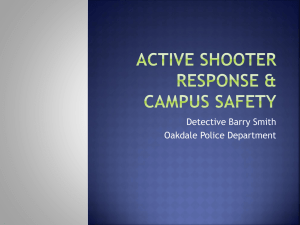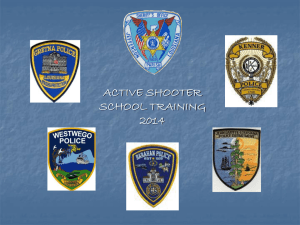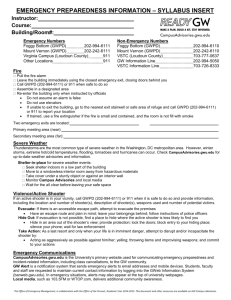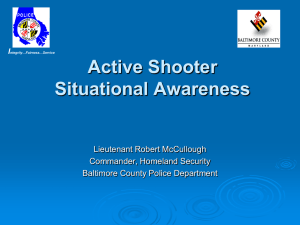Highpower Rifle Match Etiquette
advertisement
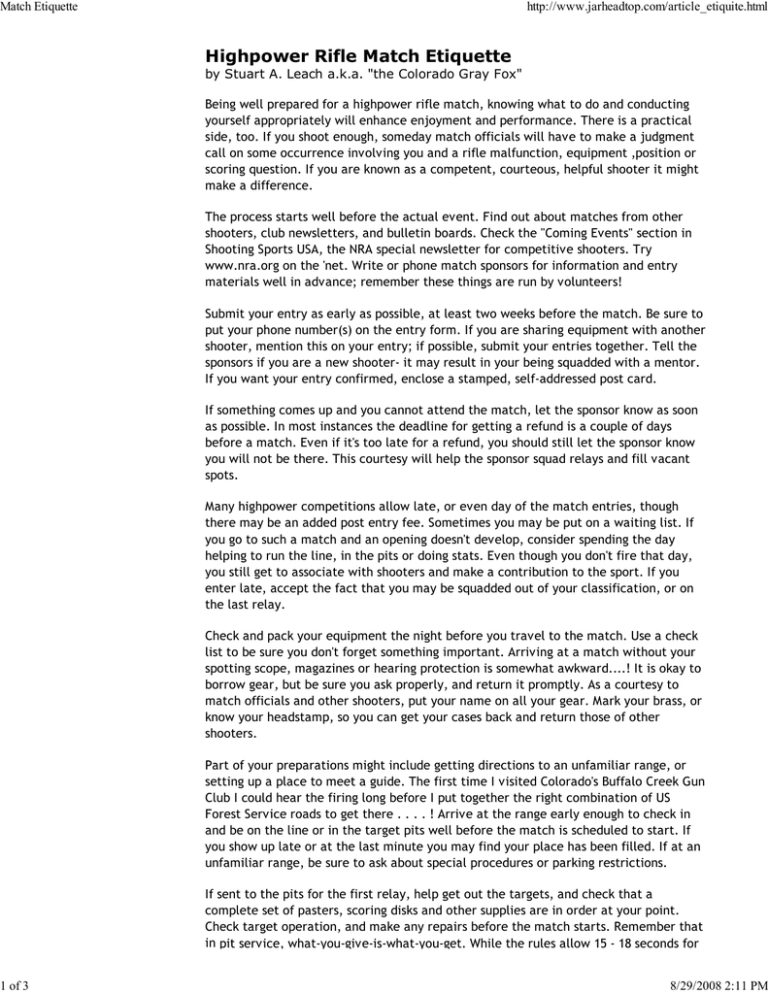
Match Etiquette http://www.jarheadtop.com/article_etiquite.html Highpower Rifle Match Etiquette by Stuart A. Leach a.k.a. "the Colorado Gray Fox" Being well prepared for a highpower rifle match, knowing what to do and conducting yourself appropriately will enhance enjoyment and performance. There is a practical side, too. If you shoot enough, someday match officials will have to make a judgment call on some occurrence involving you and a rifle malfunction, equipment ,position or scoring question. If you are known as a competent, courteous, helpful shooter it might make a difference. The process starts well before the actual event. Find out about matches from other shooters, club newsletters, and bulletin boards. Check the "Coming Events" section in Shooting Sports USA, the NRA special newsletter for competitive shooters. Try www.nra.org on the 'net. Write or phone match sponsors for information and entry materials well in advance; remember these things are run by volunteers! Submit your entry as early as possible, at least two weeks before the match. Be sure to put your phone number(s) on the entry form. If you are sharing equipment with another shooter, mention this on your entry; if possible, submit your entries together. Tell the sponsors if you are a new shooter- it may result in your being squadded with a mentor. If you want your entry confirmed, enclose a stamped, self-addressed post card. If something comes up and you cannot attend the match, let the sponsor know as soon as possible. In most instances the deadline for getting a refund is a couple of days before a match. Even if it's too late for a refund, you should still let the sponsor know you will not be there. This courtesy will help the sponsor squad relays and fill vacant spots. Many highpower competitions allow late, or even day of the match entries, though there may be an added post entry fee. Sometimes you may be put on a waiting list. If you go to such a match and an opening doesn't develop, consider spending the day helping to run the line, in the pits or doing stats. Even though you don't fire that day, you still get to associate with shooters and make a contribution to the sport. If you enter late, accept the fact that you may be squadded out of your classification, or on the last relay. Check and pack your equipment the night before you travel to the match. Use a check list to be sure you don't forget something important. Arriving at a match without your spotting scope, magazines or hearing protection is somewhat awkward....! It is okay to borrow gear, but be sure you ask properly, and return it promptly. As a courtesy to match officials and other shooters, put your name on all your gear. Mark your brass, or know your headstamp, so you can get your cases back and return those of other shooters. Part of your preparations might include getting directions to an unfamiliar range, or setting up a place to meet a guide. The first time I visited Colorado's Buffalo Creek Gun Club I could hear the firing long before I put together the right combination of US Forest Service roads to get there . . . . ! Arrive at the range early enough to check in and be on the line or in the target pits well before the match is scheduled to start. If you show up late or at the last minute you may find your place has been filled. If at an unfamiliar range, be sure to ask about special procedures or parking restrictions. If sent to the pits for the first relay, help get out the targets, and check that a complete set of pasters, scoring disks and other supplies are in order at your point. Check target operation, and make any repairs before the match starts. Remember that in pit service, what-you-give-is-what-you-get. While the rules allow 15 - 18 seconds for 1 of 3 8/29/2008 2:11 PM Match Etiquette http://www.jarheadtop.com/article_etiquite.html p , y g y g slow fire target operation, a true "Distinguished Pit Pig" can get the target down, spotted, pasted, scored and back up in 6 - 8 seconds. Listen to the pit officer. If in doubt about a shot, or how to handle a situation, ask the pit officer before you insert spotters or plug any holes! When your stint is finished police the area. If you are the last detail of the day in the pits, help put away the targets and other equipment. On the firing line two important activities take place, scoring and shooting. In either instance, know the course of fire- order of matches, number of shots, time limits, etc. When scoring you are one of the match officials. You have a responsibility to the shooter, and to the match sponsors. As a match official you must be alert, and communicate with other match officials and your shooter. At matches where target pits are used, the scorer's position is just to the rear and to the right of a right handed shooter, and to the left of the shooter who does it from the port side. You must be able to observe both the shooter and the target. You need to be able to see the action of the rifle during firing, and the target while the shooter is moving on and off the line. Call out the shots in slow fire unless told not to do so by the shooter. Call them out clearly: "Mr. Leach, your tenth shot for record is a nine." After a rapid fire string, call out the number of Xs, 10s, 9s, etc. In addition, the scorer must communicate with the Line Officer if the target is not pulled after a shot or if service is too slow. Keep in mind that a scorer is not a coach or commentator. The scorer must not give the shooter advice, or call the shots. There is no need for negative comments on the shooter's performance. Every shooter does the best he/she can on that day. Of course, if I shoot one of my rare "clean" targets, please announce it with vigor! There is an exception to the no coaching rule: if the shooter fires a miss -- completely off the target frame -- and you can see where the shot went you may advise the shooter. This is allowed because wild shots are a safety hazard and may cause scoring problems on other targets. If the target comes back up as an unspotted miss, use your spotting scope to watch the next shot closely for dirt flying outside the usual impact area. Also watch the supersonic wave trace. Before recording values on the scorecard, compare the indicated value(s) with the spotter(s). Once in a while they will not agree. If you and the shooter can agree that a slow fire shot scored as an eight is really a nine there is minimum disruption and time loss. If in doubt about a rapid fire string it is best to have the target re-scored. When scoring slow fire stay alert- it is poor form to miss a shot! Don't mess with your own gear, or converse with others. During the preparation, loading, firing, reloading and scoring phases of rapid fire strings watch the shooter, rifle and target action. If there is a problem you need to accurately tell the Line Officer what happened, how many shots were fired, shooter's actions in clearing a malfunction, etc. At reduced course matches (all firing at one distance, reduced size targets simulate the longer distances, usually without pits) observe the other shooters on your firing point. Be available for scoring, sighter spotting or target changing duty. Be ready to move up when your relay is called to the firing line. Organize your gear so you can go to the line in one trip. Try not to crowd adjoining shooters. Set up promptly, so as to not cause delays. Have most of your preparation done ahead of time, so that the "prep period" is available for final adjustments, both mental and physical. If you finish a slow fire string with several minutes remaining, you may move quietly back off the line without disturbing those still shooting. Leave your gear in place -- 2 of 3 8/29/2008 2:11 PM Match Etiquette 3 of 3 http://www.jarheadtop.com/article_etiquite.html g g y g p making a ruckus by rolling your mat or packing your stool is a real distraction to those still firing. If you finish a rapid fire string early, just stay in position for the few remaining seconds. These are just matters of common courtesy and safety. If you have a rifle that consistently flips fired cases on the adjoining shooter you should get a gunsmith to adjust the extractor and ejector. The M1 Garand and AR-15 are notorious for this problem. The other alternative is to request the right-most firing point on the line. When cleared by the line officer, move your gear off first, and then play grab brass. Clearing your equipment from the firing point allows the next shooter to begin moving up and helps the match progress smoothly. Put other shooters empty brass beside the nearest number stake. To avoid excessive delays, accept the fact that you may lose a case once in a while. If your next stop is the target pits, move your gear back to the rear of the next firing line, or well off to the side. When behind the line during firing competitors and spectators should speak in low tones so as to not disturb others. Loud or coarse language is not welcome. A rifle match is great fun, but is definitely not the place for horseplay. After firing is completed stay around for the awards ceremony, even if you were not a winner that day. The awards at most matches are modest, so we really compete for reasons of personal pride and to earn the respect and recognition of other shooters. Stay to recognize the accomplishments of those who did well. Someday you will earn that recognition. If there is no awards ceremony, politely tell the sponsors you are disappointed. There are additional benefits to staying around. This is where you learn about gear for sale, and pick up hints from top rank shooters. This is also the place to learn about upcoming matches, and perhaps arrange carpooling and housing. 8/29/2008 2:11 PM
